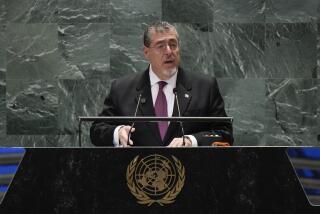U.N. Proposes ‘SWAT Teams’ for Disasters : Relief: The accent is on speed and cooperation by specially trained, unarmed personnel.
UNITED NATIONS — U.N. officials are studying the possibility of creating an international rapid deployment corps to provide humanitarian relief to any part of the world within 24 hours of a natural or man-made disaster.
Under the proposal, all governments would be invited to participate in the U.N. Humanitarian Assistance Teams by earmarking specially trained, unarmed military personnel or search and rescue forces.
These humanitarian aid “SWAT teams”--nicknamed the “Blue Bands” because of the blue armbands they would wear--would be available on a year-round basis for immediate intervention at the request of Secretary General Javier Perez de Cuellar.
In the past, the United Nations has used military and police units from member states in a number of peacekeeping operations, including the patrol assigned to the troubled border between Iraq and Kuwait.
Such arrangements have become standardized at the United Nations. Even before ground fighting in the Persian Gulf War broke out, Perez de Cuellar had drawn up plans to recruit peacekeepers from member states after the war’s end.
But after the Persian Gulf War, U.N. relief officials received criticism on the slow response to the massive flight of Kurdish refugees from Saddam Hussein’s regime in Iraq. The terrible conditions many of the Kurds endured captured worldwide attention.
Later, when a deadly cyclone struck Bangladesh, killing more than 125,000 people, the United Nations again was criticized for haphazard and ineffective relief.
The proposal being studied by high U.N. officials acknowledges the difficulties that the world organization faces in organizational capacity and in mobilizing resources, personnel and supplies to cope with humanitarian emergencies.
“What is needed when disaster strikes is an enhanced capability for the immediate deployment of organized personnel, logistics support for such deployment and the high-speed delivery of humanitarian relief supplies in the field,” the proposal being studied by Perez de Cuellar said.
Under the plan, the humanitarian corps would be called on in the first phase of the emergency--the time when lives are at greatest risk in the aftermath of a disaster. The response team’s intervention would cease after necessary steps by traditional U.N. relief organizations have been taken.
A key part of the plan would be creation of an up-to-date register of personnel, equipment, supplies, logistics and transport support available from participating countries. When a disaster occurs, the secretary general would designate the governments requested to provide assistance. The U.N. would give permanent, centralized machinery for coordination.
Extra costs incurred by countries participating in the humanitarian assistance teams would be treated as voluntary, additional contributions, not funds in lieu of regular contributions provided for humanitarian relief.
Politically, the plan would allow some member states to deploy unarmed military units under U.N. mandate while avoiding problems that might arise if they were called upon to take part in traditional peacekeeping operations.
U.S. officials said the proposal by the U.N. staff has merit but requires further study.
More to Read
Sign up for Essential California
The most important California stories and recommendations in your inbox every morning.
You may occasionally receive promotional content from the Los Angeles Times.









